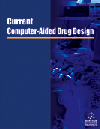
CoMFA and CoMSIA Studies on Aryl Carboxylic Acid Amide Derivatives as Dihydroorotate Dehydrogenase (DHODH) Inhibitors
DHODH is a flavoenzyme that catalyzes the oxidation of dihydroorotate (DHO) to orotate (ORO) as part of the fourth and rate limiting step of the de novo pyrimidine biosynthetic pathway. Inhibitors of DHODHs have proven efficacy for the treatment of cancer, malaria and immunological
disorders. 3D QSAR studies on some aryl carboxylic acid amide derivatives as hDHODH inhibitors were performed by comparative molecular field analysis (CoMFA) and comparative molecular similarity indices (CoMSIA) methods to rationalize the structural requirements responsible for the inhibitory
activity of these compounds. The alignment strategy was used for these compounds by means of Distill function defined in SYBYL X 1.2. The best CoMFA and CoMSIA models obtained for the training set were statistically significant with cross-validated coefficients (q2) of 0.636 and 0.604 and
conventional coefficients (r2) of 0.993 and 0.950, respectively. Both the models were validated by an external test set of five compounds giving satisfactory prediction (r2 pred) of 0.563 and 0.523 for CoMFA and CoMSIA models, respectively. Further the robustness of the model was verified
by bootstrapping analysis. Generated CoMFA and CoMSIA models provide useful information for the design of novel inhibitors with good hDHODH inhibitory.
Keywords: 3D QSAR; CoMFA; CoMSIA; aryl carboxylic acid amide derivatives; bootstrapping analysis; compounds; design; hDHODH inhibitors; model; molecular field analysis
Document Type: Research Article
Publication date: 01 December 2012
- Current Computer-Aided Drug Design aims to publish all the latest developments in drug design based on computational techniques. The field of computer-aided drug design has had extensive impact in the area of drug design. Current Computer-Aided Drug Design is an essential journal for all medicinal chemists who wish to be kept informed and up-to-date with all the latest and important developments in computer-aided methodologies and their applications in drug discovery. Each issue contains a series of timely, in-depth reviews written by leaders in the field, covering a range of computational techniques for drug design, screening, ADME studies, etc., providing excellent rationales for drug development.
- Editorial Board
- Information for Authors
- Subscribe to this Title
- Ingenta Connect is not responsible for the content or availability of external websites
- Access Key
- Free content
- Partial Free content
- New content
- Open access content
- Partial Open access content
- Subscribed content
- Partial Subscribed content
- Free trial content